5 lessons from the simple life that beat stress
This website may earn commissions from purchases made through links in this post.

Can you feel it?
The tension creeping into your shoulders and neck. The tightness in the chest. The clenched jaw, the pounding head, the fatigue. The temper that is bubbling just below the surface, waiting to explode.
The stress of it all.
It’s a modern epidemic.
One in four Australians report feeling moderate to severe levels of stress. 72% of Australians report that stress has at least some impact on their physical health and 64% on their mental health [source].
And what’s stressing us out the most? Money, family, health and work – in that order [source].
Life is all about being busy. We’re all striving for bigger and better in every aspect of life. A bigger home, a fitter body, smarter kids, a more successful career.
We just want to get ahead or the race.
And we’re running the marathon as though it’s a sprint. It’s no wonder we’re burned out.
There are plenty of tips out there to help you manage stress. Breathe deeply. Get a good night’s sleep. Delegate. Be more organised.
The problem is those tips are simply Band-Aids for a gushing artery.
The cure is simple living.
A cultural paradigm that centres on sufficiency, not more and more. Where we value humans over speed. Skill over automation. Relationships over excessive profits.
Ok, so you may not be ready to throw off your shackles and join a hippy commune (I’m not – I’m just an ordinary suburban mum living it just like everyone else), but there are a few lessons we can learn from the simple life to that will help beat the stress.
5 lessons from simple living that will beat stress
1. De-schedule
The truth is, you’re doing too much.
Efficiency and organisation won’t cut it. You could be Wonder Woman, and still not conquer Mount To-Do. Because the darn thing never stops growing. There are tectonic forces that keep pushing that Mount higher and higher.
It feels like all those things we need to do are super important. But most of them aren’t. The world keeps turning even if the toilet hasn’t been cleaned or you miss a swimming lesson.
Simple living is about being less busy and focusing on the things that are truly important. Like family. And friends. And community. And all those things that make life good.
There’s one very simple, yet very powerful strategy you can use to conquer the stress and overwhelm of too much to do: ask yourself all the time, “what is the most important thing I need to do right now?”
Do that. Let go of everything else.
2. See Sufficiency
One of the reasons why money is our biggest cause of stress is because we think we don’t have enough.
But money is not the problem, it’s the constant striving for more and more, bigger and better, and the feeling that there’s not enough money (or anything else) to meet those so-called needs and wants.
Yes, there are people who genuinely struggle with making ends meet and lack of money is a genuine cause of stress. I’m not fluffing over the very real issue of poverty.
But most of us have more than enough. The stress isn’t caused by lack of money, it’s caused by the perception of not enough.
“For me, and for many of us, our first waking thought of the day is ‘I didn’t get enough sleep’. The next one is ‘I don’t have enough time.’ Whether true or not, that thought of not enough occurs to us automatically before we even think to question or examine it. We spend most of our hours and the days of our lives hearing, explaining, complaining or worrying about what we don’t have enough of… Before we even sit up in bed, before our feet touch the floor, we’re already inadequate, already behind, already losing, already lacking something. And by the time we go to bed at night, our minds are racing with a litany of what we didn’t get, or what we didn’t get done that day… This internal condition of scarcity, this mindset of scarcity, lives at the heart of our jealousies, our greed, our prejudice and our arguments with life.” [ source]
The antidote is sufficiency. Of looking around and seeing you do have enough. That you are enough.
I have another simple and powerful strategy, this one for seeing sufficiency. It’s one you’ve heard a thousand times before. But it works.
Give thanks. Count your blessings. Literally, write a numbered list of all the things you do have. When the chips are down, when you’re feeling a strong sense of lack, go get that list out and focus on those things and know that it is enough.
3. Live with Purpose
The meaning of life is to find your gift. The purpose in life is to give it away.” – Pablo Picasso
Rowing against the current takes a lot of hard work. It consumes all your energy just to stay still, let alone get ahead.
On the other hand, rowing with the tide means that you’re at one with the flow of energy. Your job is to steer – you don’t have to fight the current.
Are you working with your purpose or against it?
Research shows that following your life’s purpose reduces stress. Studies have found that people who have a strong sense of purpose feel less stress and live a longer, healthier, happier life.
Your purpose is something bigger than you and your personal goals (although these are important too). It is your unique gift to the world. Service is not a popular idea anymore, but the most content people are those who are ‘outward thinking’: thinking about how they can serve others.
What matters most to you? What is your purpose? Do that.
4. Reconnect with nature
There’s something about the four elements that soothes the soul. Air, earth, fire and water are panaceas for just about anything.
If you’re a parent, you know how just going outside can calm a fractious toddler.
Or putting them in the bath.
That compulsion they have to collect rocks and leaves and sticks and jump in puddles and play in the dirt comes from that an instinctive connection with the natural world.
Again, research supports the idea that nature is important for our health. For instance, studies show that gardening significantly decreases the stress hormone cortisol and restores a positive mood.
To reduce stress, spend as much time in the great outdoors as possible (or take a leaf out of the kids’ book and bring the great outdoors in). Walk on the grass barefoot during your lunch break, gaze out at the ocean*, watch the moon rise, hug a tree, plant a garden, sing in the rain.
We get a double dose of stress relief if we are active in nature (all those feel-good endorphins that come from exercise): swim in the ocean, ride a bike to the farmer’s market on the weekend. Walk along the beach. Make movement part of your everyday.
5. Unclutter
I love my smart phone. I love browsing Pinterest when I have some down time.
But while I enjoy it, I always come away feeling a little frazzled. Why?
Partly because screen time increases our stress levels, despite the fact that we use it to relax.
But I also think it adds to our mind clutter. Email, reality TV shows, Facebook updates, Pinterest projects, games, apps, ads…it’s hard to find peace of mind when you allow your mind to be constantly bombarded by stimulus.
And all that mind clutter, that’s on top of the physical clutter surrounding us as we veg out on the couch.
Physical clutter is stressful. You have to keep it clean, keep it organised, keep it tidy. And you don’t have that much time as it is.
Reducing both the mind clutter and the physical clutter allows you to be more present and less stressed.
How can you simplify without feeling like you’re going without?
In true KonMarie* fashion, the things you own, the things you introduce into your life (be they physical or through a screen) should bring you joy, not add to your overwhelm.
Stress is a modern epidemic brought on by a lifestyle that is not sustainable for us, for our society or for the planet. The simple life offers lessons for a less stressful life that we can apply to our own life, even if it means we don’t overhaul our whole lives.
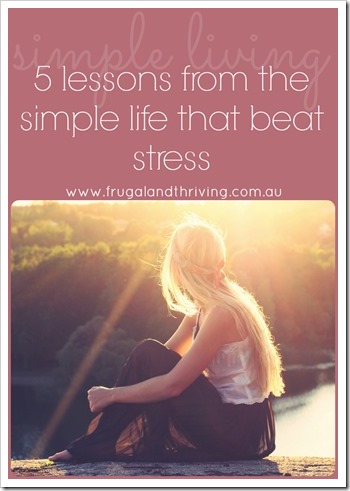

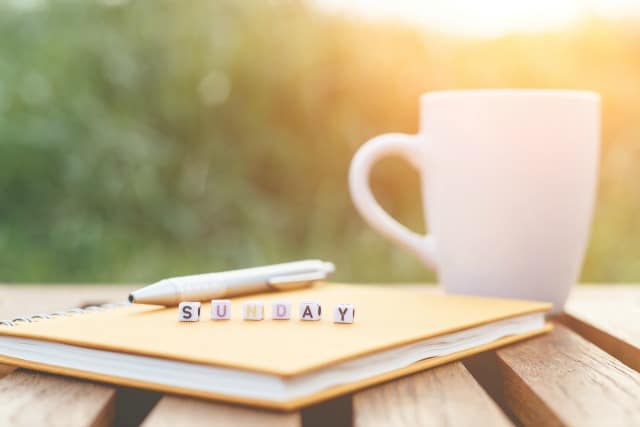
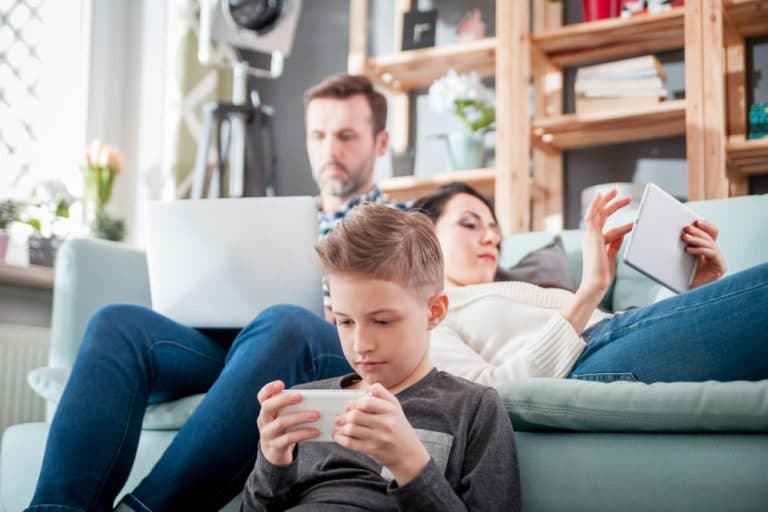
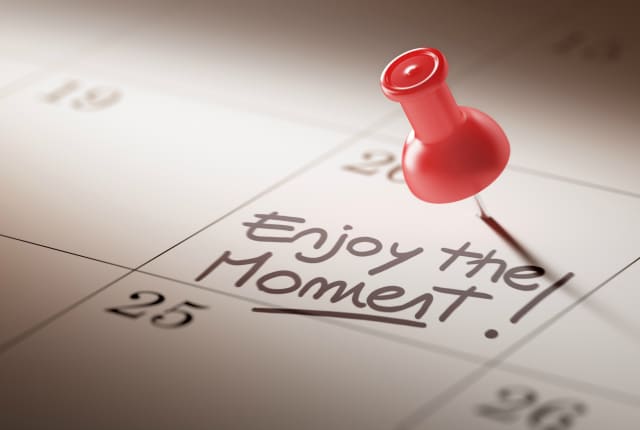

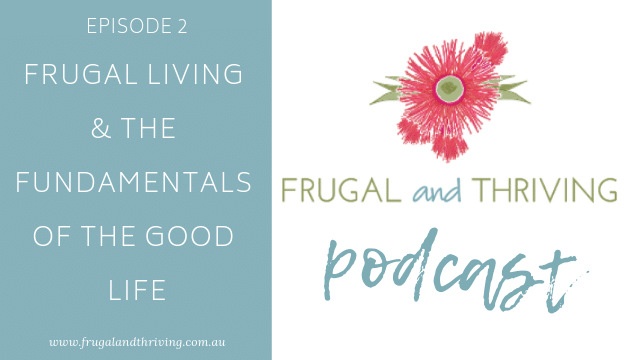
A timely post to help me reassess what I’m doing at the moment. Life feels hectic. Too many animals I think but I’ll dwell on this today. Thank you.
Hi Linda,
Nice to hear from you. Hectic seems to be the currency for all of us at the moment, although too many animals sounds nice! Hope things go well for you :)
Melissa
Clutter… Ah! When I moved into my present house, I only took the bare necessity with me, and firmly decided to keep things under control. So far, after approx. 1 and a half year, it’s been a success. The house is not large, and everything has its place. For example, I have a small linen cupboard where all my necessary items can go, but not much more. So I decided that buying doona covers as a “sport” (I LOVE donna covers!) was off limit for good this time. I have 3 of them and as long a one of them doesn’t fall apart, I wont add any item. Same for the bath/hand/beach towels.
Kitchen: the same. Have a set of 6 bowls/large plates/small plates that I really like and enjoy using every day, instead of having a “good” but unused one and a less enjoyable one for the everyday. Glasses, cutlery same, pans, same principle. A bit harder for baking/serving plates though I have to admit.
Where I stuggle is with art and craft. I’m a crafter and love spending time with kids, glue, paint, paper and so on. This is an area where it very difficult (for me) to not go overboard, but as the kids grow and their needs change, it’s getting easier.
It is so true that without clutter, life is so much less stressful.
I love reading your articles, they are always interesting and informative, and very well documented. Thanks for the effort you are making to share your knowledge.
Corinne from the Blue Mountains
Hi Corinne,
Thank you for your comment. I love how you have a thing for doona covers! We all have our one weakness :). But it sounds like you have your stuff under control. I still struggle with it – I hate getting rid of stuff.
It’s easy to go overboard with kids art and craft, I can so relate! We have heaps and heaps (I feel less guilty if I’m buying something for the kids), and the bits of paper and stuff spread from one end of the house to the other drives me crazy, but I think craft is so good for the soul. I have an article in the back of my head on essential craft items for kids as I watch what they use and don’t use.
Thank you for your kind comments. It’s lovely to hear from you.
Melissa
Well what can I say about all that stress and clutter? Well I’m using less Facebook/YouTube/music/Pinterest/books/mugs/socks/shoes/suits/ties/wine/food/pear cider/Scotch whisky/etc. That way I’m bringing to myself joy and not adding to my overwhelm. It will certainly be simple without the painful simplicity of getting rid of my possessions, why do people clutter their lives with more bigger items, more busy activities, and keeping more money? I say spend all of your money, being content with less. :P
No doubt there is a middle ground between hoarding and spending everything.